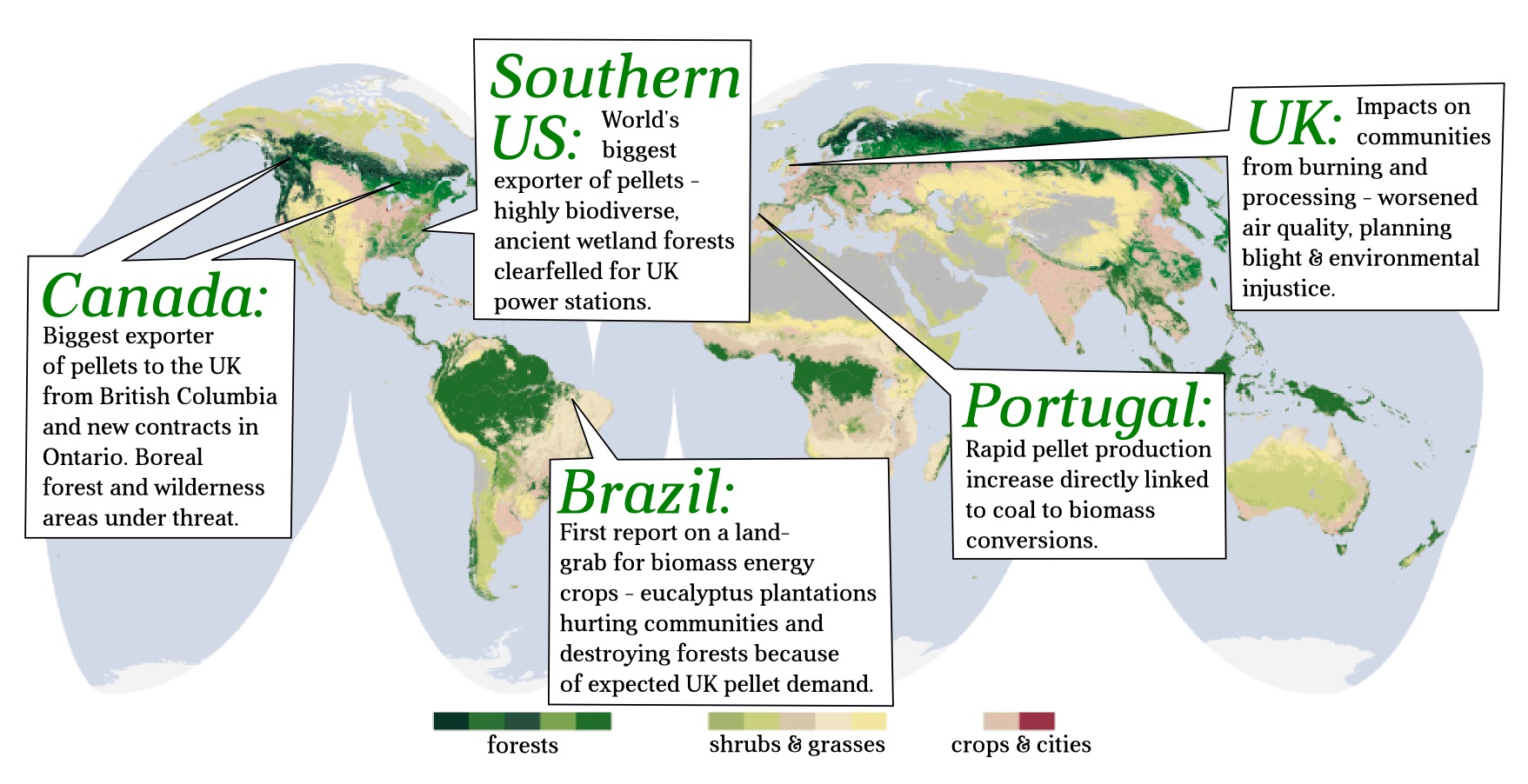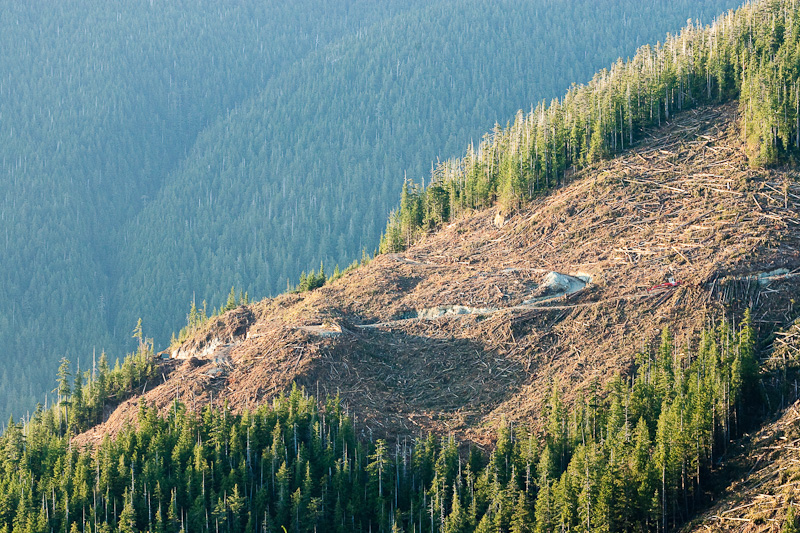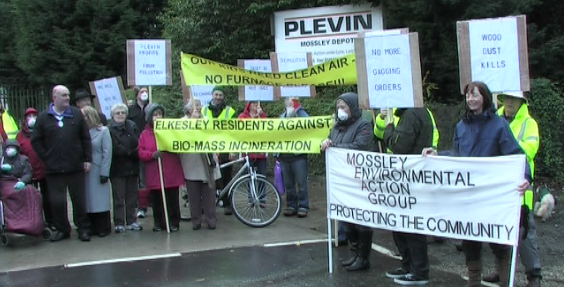The UK’s big biomass demand
Demand for biomass is sky-rocketing in the UK, with 42 new biomass power stations proposed across the country. Energy companies have announced plans to burn over 68.9 million tonnes of biomass, nearly seven times the UK’s current total annual wood production.
Burning biomass for large-scale electricity generation is a key element of the UK Government’s renewable energy policy. Their 2012 UK Bioenergy Strategy states that bioenergy could provide between 8% and 11% of the UK’s primary energy demand in 2020 – i.e. the majority of the country’s overall renewable energy target of 15% by that date. Although bioenergy includes biofuels for transport, the bulk of that figure would come from burning wood.

The Biomass Chain of Destruction: A new report by Biofuelwatch highlights the impacts of big biomass around the world. Credit: Biofuelwatch
The biomass chain of destruction
While biomass is currently classed as ‘renewable’ energy, it is anything but sustainable or carbon neutral. If all of the proposed biomass plans are implemented, the UK will have to import 80% of its biomass by 2020.
This new and increasing demand for biomass is encouraging logging of wildlife-rich forests around the world, as well as the planting of monoculture tree plantations at the expense of native forests and the people who depend on them. Then, when the biomass is finally burnt in power stations in the UK, harmful pollutants are emitted which have serious health impacts on surrounding communities.
These disastrous implications prompted Biofuelwatch to publish a report in October 2013, entitled ‘Biomass: The Chain of Destruction’. In it, we investigate the very real effects of the UK’s demand for biomass from point of extraction to point of use.
Communities forced off their land in Maranhão, Brazil
In the Brazilian state of Maranhão, one of Brazil’s largest pulp and paper companies, Suzano Papel e Celulose, is taking land off traditional communities and replacing them with eucalyptus plantations for wood pellet production, in reaction to anticipated demand for biomass from the UK. Rich forest vegetation, home to countless plant and animal species, is being bulldozed and communities are experiencing the loss of their livelihoods, land and traditional way of living as a result.
Forest destruction in the Southern US and Canada
At present, virtually all wood which is imported for bioenergy is being burned in coal power stations, primarily by Drax in Yorkshire. Nearly all of it comes from Canada and the southern US. The southern US wetland forests are the last refuge for large numbers of species. Indeed, they are one of the most biodiverse freshwater ecosystems in the world. These forests are now being clear-cut to make pellets, including for Drax.
Portugal’s plantation deserts
According to the Food and Agriculture Organisation (FOA), 38% of Portugal’s land area is forested and forests have been slowly increasing in size since 1990. However, this figure is distorted by the fact that industrial pine plantations are falsely classed as ‘forests’ rather than defining them as ‘planted forests’. Such plantations, according to the FAO, have increased by 14,000 hectares since 2000. Significantly, pellet production in Portugal has also increased from a small-scale industry in 2005 to one with a total production capacity of around 850,000 tonnes a year. Almost all of this production is exported to elsewhere in Europe, with only 9% remaining in Portugal.
There are concerns that eucalyptus plantations could expand in response to an increasing demand for woodchips and pellets from the UK. A spokesperson from the Portuguese environmental NGO, Quercus, describes the ecological implications of the plantations: ‘Our fauna can’t feed on it; they can’t find refuge in it. Our insects can’t eat eucalyptus, so there are no birds…In a native oak forest you’d find, in one hectare of woodland, at least 70 or 80 species of plant. In a eucalyptus forest, you would hardly find more than 15.’
The local impacts of burning biomass
The most serious local impacts of biomass electricity are those on air quality and public health, resulting from the emissions released when biomass is burnt in power stations. Although waste wood (much of it chemically treated) is widely seen as a particularly ‘sustainable’ source of biomass electricity, burning it results in particularly high levels of toxic air emissions. And it is not just residents living close to power stations who are affected but also ones living close to wood recycling plants, which increasingly supply energy companies with woodchips. The report ‘Biomass: The chain of destruction’ contains a series of testimonies from community activists, which illustrate the lack of any effective regulation, planning policies and mechanisms which would protect public health from dangerous and harmful levels of pollution.
There is a substantial amount of research which shows that these polluting industries often have a disproportionate impact on more deprived communities. Biofuelwatch undertook an investigation, looking at the levels of deprivation in communities located near to biomass power stations in the UK. The findings show that biomass power stations in England are located in areas which are relatively more deprived than other parts of England. And in Scotland, all of the larger planned biomass power stations (of 50 megawatts in size and over) are in relatively deprived areas. To our knowledge this is the only study of its kind to have been attempted for biomass power stations in the UK and there is a great need for more research to be done into this important area of environmental justice.
The need for genuine renewable energy
The evidence shows that not only is large-scale biomass electricity not environmentally sustainable, but that it also has negative impacts on people around the world. As a result, it is imperative that biomass is no longer seen as the solution to our urgent need to stop using fossil fuels. Only a major policy change, away from large-scale combustion (be it of fossil fuels or biomass), towards sustainable and genuinely climate-friendly renewable energy and, crucially, towards much lower levels of energy use in the UK, can prevent the impacts described here from escalating.
Please tell the Government that they must not offer loan guarantees to destructive biomass schemes! Sign our petition here: http://www.biofuelwatch.org.uk/2013/ukguaranteescheme-alert/
To read the full report and access all references:
http://www.biofuelwatch.org.uk/2013/chain-of-destruction/
For a full Biomass FAQ:
http://www.biofuelwatch.org.uk/2013/biomass-faq-2/
To access the Biofuelwatch website:
www.biofuelwatch.org.uk




